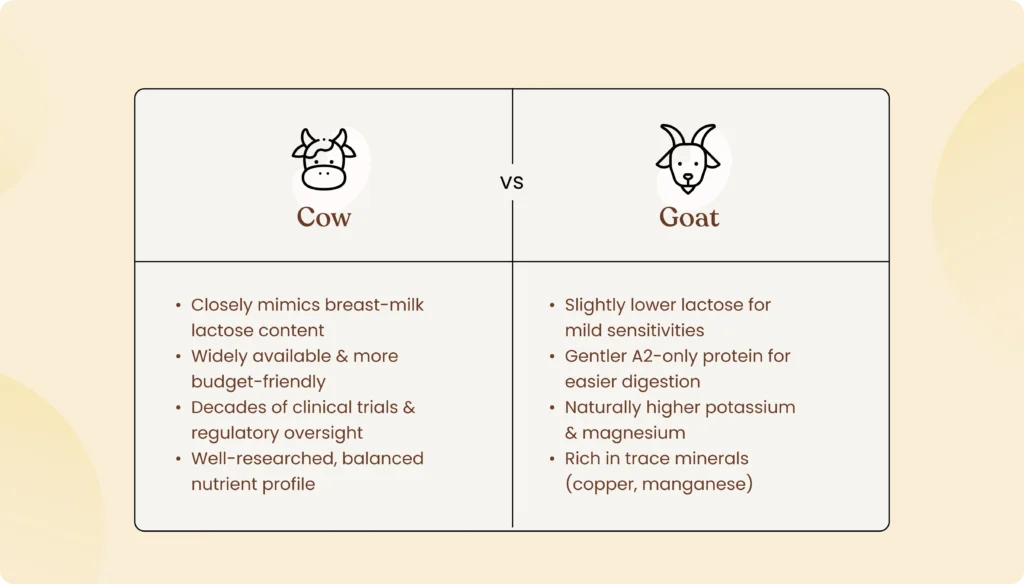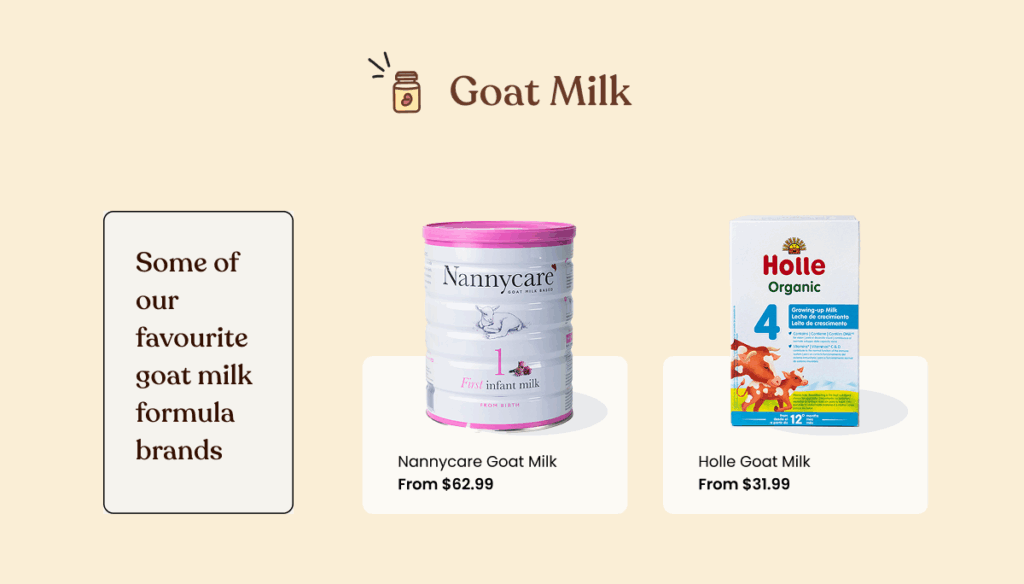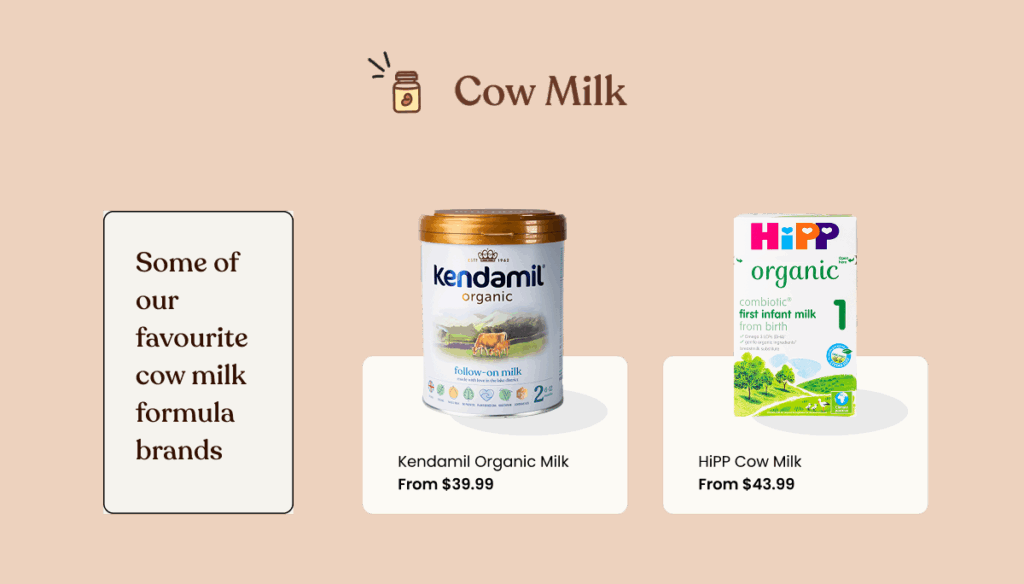Deciding on the right infant formula can feel overwhelming, especially when every baby’s needs are unique. Some little ones breeze through feedings, while others end up with fussiness, gas, or even skin flare-ups that shadow those precious moments. In fact, studies show that up to 15% of infants experience colic, gas, or eczema on standard cow-milk formulas.
Backed by the latest pediatric nutrition research and insights from leading lactation consultants, this comprehensive guide walks you through everything you need to know about choosing goat or cow milk formula – whether you’re an expecting parent planning ahead, or you’re already navigating sensitive tummies.
For Babies with Digestive Sensitivities
If your little one is battling colic, gas, or fussiness after feeds, goat milk formula may offer relief where cow milk formulas fall short. Unlike most cow milk, which contains a mix of A1 and A2 β-casein, goat milk is virtually 100% A2 protein.
This matters because A2 β-casein breaks down into smaller, softer curds in the stomach, mirroring the gentle curd structure of breast milk and easing passage through the digestive tract. Parents often report fewer episodes of gas, spitting up, and general discomfort when making the switch.
Goat milk formula also typically has slightly lower lactose levels than cow milk alternatives, providing an added benefit for babies with mild lactose sensitivity. While it’s not a substitute for a fully lactose-free formula in cases of diagnosed intolerance, that modest reduction can make a noticeable difference in tummy comfort for many infants.
When combined with the naturally higher concentrations of minerals like calcium and magnesium, goat milk formula becomes a compelling choice for sensitive tummies, supporting not only easier digestion but also steady nutrient absorption.

Lactose Levels in Goat vs. Cow Milk Formula
Lactose is the primary carbohydrate in breast milk, fueling infant growth and aiding in calcium and water absorption. Standard cow-milk formulas contain about 4.7 g of lactose per 100 mL, closely mimicking breast milk’s composition and providing sustained energy for healthy development.
In contrast, goat-milk formulas average slightly lower lactose levels – around 4.1 g per 100 mL, which can offer mild relief for babies with lactose sensitivity without resorting to fully lactose-free options.
That modest 0.6 g difference may sound small, but for infants who exhibit fussiness, gas, or mild digestive discomfort, the reduced lactose load can translate to noticeably smoother feedings.
However, goat-milk formulas are not suitable for babies with diagnosed lactose intolerance; in those cases, a specialised lactose-free formula remains essential. As always, consult your paediatrician before making any formula changes to ensure your baby’s unique needs are met.
For Expecting Parents & Planning Ahead
When you’re choosing a formula in advance, you’ll want to weigh factors like nutrient consistency, cost, taste, and ease of preparation alongside basic digestive comfort.
Both goat and cow milk formulas are fortified to meet strict infant nutrition guidelines, so they’ll each supply the proteins, fats, carbohydrates, vitamins, and minerals your baby needs. However, cow milk formulas benefit from decades of research, offering a reliably balanced nutrient profile at a generally lower price point and broader availability.
Goat milk formulas, on the other hand, start from a naturally gentler protein structure and slightly different native mineral baseline, closer to breast milk in some respects – but often carry a premium cost and can be harder to find locally.
Next, we’ll explore the pros and cons of both to help you decide which formula best supports your baby’s growth.

Mineral Profiles for Growth & Development
Both goat and cow milk formulas are fortified to meet stringent infant nutrition standards, but the native mineral content of goat milk gives it a slight edge in certain nutrients. According to a comparative analysis of retail milks, goat milk naturally contains:
- 33.3% more potassium – Important for muscle function and fluid balance
- 27.3% more magnesium – Supports bone development and neuromuscular health
- 102.8% more copper and 144.9% more manganese – Trace minerals involved in enzymatic processes and antioxidant defences
Even after fortification, these baseline differences mean that goat milk formulas often deliver marginally higher levels of these minerals per serving, which can be beneficial for infants who need extra support in growth or muscle function.
Cow milk formulas, by contrast, start from a consistently high calcium baseline and benefit from decades of clinical research and tight regulatory oversight. Their global production networks make them more affordable and widely available, and many babies adapt readily to the familiar taste and texture.
Why Cow Milk Formula Remains the Standard
- Cow milk–based formulas have been studied extensively since the mid-20th century, with thousands of clinical trials confirming their safety, digestibility, and nutritional adequacy. Regulatory bodies like the FDA and EFSA have well-established guidelines based on this robust evidence.
- Large-scale manufacturing processes ensure each batch of cow milk formula meets exact nutrient specifications, giving parents confidence in predictable nutrition.
- Cow milk formulas benefit from global production networks, making them widely available and generally more affordable than goat alternatives.
- Generations of feeding experience mean many infants adapt quickly to the familiar flavour and texture of cow milk formula, resulting in fewer feeding refusals.
Both options exceed infant dietary requirements and can support healthy development; weigh your baby’s specific growth needs, any paediatrician guidance, and your own preferences for cost and availability when making your choice.
Which Formula Is Right for Your Baby?

Choosing between goat and cow milk formula ultimately comes down to your baby’s individual needs and your family’s priorities. If your little one has shown signs of digestive discomfort, such as frequent gas, colic, or fussiness after feeds, the gentler curd structure of A2 protein and modestly lower lactose in goat milk formula may provide welcome relief.
On the other hand, if your baby tolerates standard formulas well, you might prefer the consistent nutrient profile, broader availability, and lower price point of cow milk–based options.
Beyond digestion and mineral content, consider these factors as you decide:
- Many infants instinctively take to the familiar flavour of cow milk formulas, whereas goat milk’s slightly tangier taste can require an adjustment period.
- Cow milk formulas benefit from large-scale production, making them more budget-friendly and easier to find at local retailers.
- Decades of clinical research and strict oversight by authorities like the FDA and EFSA mean cow milk formulas carry a long track record of safety.
- Goat milk’s natural boosts in potassium and magnesium may be advantageous if your paediatrician has highlighted specific growth or muscle-development concerns.
By weighing digestive tolerance, nutritional priorities, and practical considerations like cost and availability, you can select the formula that aligns best with your baby’s health and your family’s lifestyle.
Our Top Picks For Cow and Goat Formula
Whether you’re soothing a sensitive stomach or looking for a reliable everyday formula, our experts have hand-selected these top formulas:
Goat Milk Formula
A2-only protein, gentle probiotics, and a naturally softer curd structure – ideal for little tummies that need extra TLC.
Certified organic, minimally processed to preserve natural minerals, and free from additives – perfect for parents who want a truly wholesome option.

Cow Milk Formula
HiPP Comfort Combiotik (Cow Milk Formula)
A unique blend of prebiotics and lactose that closely mimics breast milk, plus added nucleotides to support immune development – trusted by thousands of families.
Kendamil Organic Whole Milk Formula
Creamy whole-milk base, no palm oil, and fortified with iron, DHA, and vitamins A & D for balanced growth – great as a daily go-to at an affordable price.


